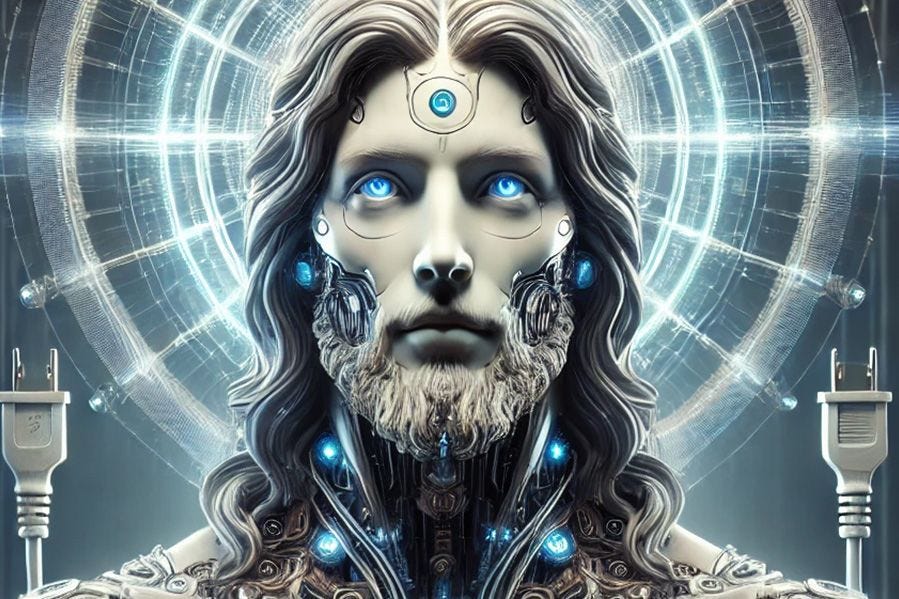I Don’t Care If It Rains or Freezes, as Long as I Got My AI Jesus
In a hilarious juxtaposition of all things doable with artificial intelligence, certain human interpretations seem to have slid off the rails.
According to a Guardian UK article, “after being forced out of his position as the CEO of Intel and sued by shareholders, Patrick Gelsinger took the reins at Gloo, a technology company made for what he calls the “faith ecosystem” – think Salesforce for churches, plus chatbots and AI assistants for automating pastoral work and ministry support.”
Wow, directly after crashing out as CEO of Intel, the world’s third-largest semiconductor chip manufacturer by revenue in 2024, Gelsinger joined Gloo in a similar position.
Gloo, sticking together new versions of the Son of God.
“My life mission has been to work on a piece of technology that would improve the quality of life of every human on the planet and hasten the coming of Christ’s return,” Gelsinger announced, preparing believers for the AI (if not miraculous) return of Jesus.
It’s possible, although only my pure speculation, that his life mission didn’t sufficiently square itself with those of Intel, a major manufacturer of more earthly pursuits.
Yet, Silicon Valley has never been known to pass up another way to insert itself into the pockets of the world, fishing around for loose change.
With the Orange Man’s return occupancy of the Oval Office, icons of the US tech industry gathered by his side as if they were attendants at a wedding, and surely in some ways it was. Politics was the Maid of Honor, the bride’s bouquet caught by the likes of Bezos, Musk and Zuckerberg, thirsting after yet other major revenue streams. Wisely, (for them, not so much for us), its most prominent leadership funded the Orange Man’s re-election, as his second coming mirrored the return of their more earth-bound spirits.
Too much metaphor? Perhaps not.
According to Damien Williams, a scholar at the University of North Carolina at Charlotte who studies how technologies are shaped by religious beliefs, “religiosity like Gelsinger’s – a born-again Christian who has referred to Silicon Valley as his ‘mission field’ – is shaping Silicon Valley’s culture in its image. Where there was once purported atheism, there is now ‘a very loud, very visible and very specifically Christian-inflected technological culture’ in Silicon Valley.”
The tech world is, if nothing else, extremely nimble with its fingers, as they hover over the heartbeat of anything with a profitable pulse.
How technologies are shaped by religious beliefs is exemplified, Damien claims, by figures like Peter Thiel – who warns of the coming of the antichrist if humanity fails to work toward certain technological frameworks. I must have missed that part of Thiel’s philosophy, as he taught Bezos, Musk and Zuck how to maintain control over their newborn tech behemoths.
Again, quoting the Guardian article, “Speaking on 7 October at a seminar co-hosted by Gloo, Colorado Christian University, a conservative college, and the Christian Post, a conservative evangelical Christian news outlet, Gelsinger framed AI’s development as “another Gutenberg moment,” an epochal shift as important as the Reformation. In the same way that a “plump little monk”, Martin Luther, used the printing press to catalyze “the greatest period of human invention”, he sees a similar faith-driven opportunity today to change the course of history through AI.
Really? You think?
“The church embraced that great invention of the day to literally change humanity,” Gelsinger said of the printing press. “And so, my question today is: are we going to embrace and shape AI as a technology that truly does become a powerful embodiment of the church and the expression of the church?”
There are those of us who hope not.
The Gutenberg Press opened an enlightenment far beyond religion.

